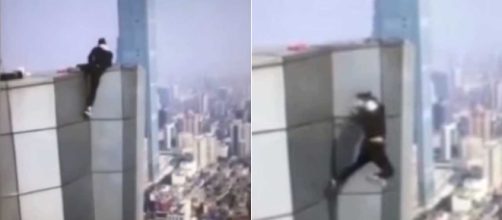Most people have seen videos shared on social media that evoke comments such as 'no way'; 'that’s just insane'; and 'epic.' Wu Yongning, dubbed the 'Chinese Superman,' was known for his Daredevil videos that featured him climbing skyscrapers and performing death-defying stunts. Chinese media reported Yongning fell 62 floors to his death on November 8, according to several news agencies.
The 26-year-old scaled heights that made many viewers gasp, sweat, and watch – despite a having mixture of uncomfortable feelings. His hair-raising exploits garnered 60,000 people who followed his videos posted to Weiblo, which is much like Twitter.
Wu also posted 300 videos to Volcano, a live-streaming site, and attracted one million followers. His fans speculated that Wu may have died when there were no posts on his account during November.
Why die during a stunt called ‘rooftopping’?
Wu’s girlfriend, who goes by the name Jin Jin, confirmed his death on Monday, KHOU and the Daily Mail (UK) reported. A window cleaner found Wu’s body. His girlfriend told news media in China that he was planning to ask her parents for permission to marry, but first wanted to win a challenge that is known by the term “rooftopping,” the New York Post noted.
The act of rooftopping entails no safety equipment. Police verified that Wu died during the stunt, though it is unclear who sponsored the challenge that involved a cash prize.
Upon winning the challenge, Wu hoped to receive the $15,000 (80,000 yuan) prize to present to his girlfriend’s family as a gift for covering wedding costs. He also planned to use some of his winnings to help pay for his ailing mother’s medical treatment.
Over ‘15 million views’ of 45-foot fall from skyscraper
Wu’s final stunt was filmed and has tallied “more than 15 million views”, the Post reported. The number of views does not also represent the sum of people who have watched YouTube videos that show him falling 45-feet to his death from the side of the Huayuan International Centre skyscraper in Changsha, which is the capital of Huan Province, the Daily Mail reported.
China warns against livestreaming ‘risky stunts’
Following Wu’s death, state media in China, the People’s Daily, has warned people about the dangers of livestreaming, Channel NewsAsia reported. Chinese officials are also cautioning people who seek to use social media “to make it big” by posting videos of “risky stunts,” according to the Post.
Wu’s death, according to an editorial by the China Daily, resulted partially from the “affirmation” he attained when he posted his daredevil escapades to social media accounts, the Washington Post noted. His last recorded stunt showed Wu hanging off the side of the skyscraper. After doing a few pull-ups, it appeared he lost his grip and traction. He then plummeted to his death.
Desire to profit leads to increase in popularity of extreme videos
In an effort to obtain “stardom,” NewsAsia noted that thousands of Chinese share videos “on the livestreaming scene.” The popularity of extreme acts, depicting people in precarious situations, has risen dramatically, especially in social networking, e-commerce, and “gaming sectors.” China Daily attribute the increase in popularity to the fact that the more viewers videos draw increases the opportunity for making a profit.
Rooftopping not the same with safety precautions
A Weiblo user that the New York Post cited, raised the question about why people aspire to achieve attention by putting themselves in dangerous situations. The account holder then backtracked when learning that Wu accepted and took part in the rooftopping challenge to help with his mother’s medical needs.
“I became speechless,” the user stated, adding that Wu was a person who was willing to “do anything” for his “loved ones.”
James Kington, who is a daredevil climber in the UK, said that wearing safety devices equates with having doubt, which is when “things can go wrong,” the New York Post reported, citing a 2016 BBC report. Even when safety is questionable, climbers like Kington believe that safety precautions take away from the “experience.” He stated that it “completely changes the way you look at things.”




